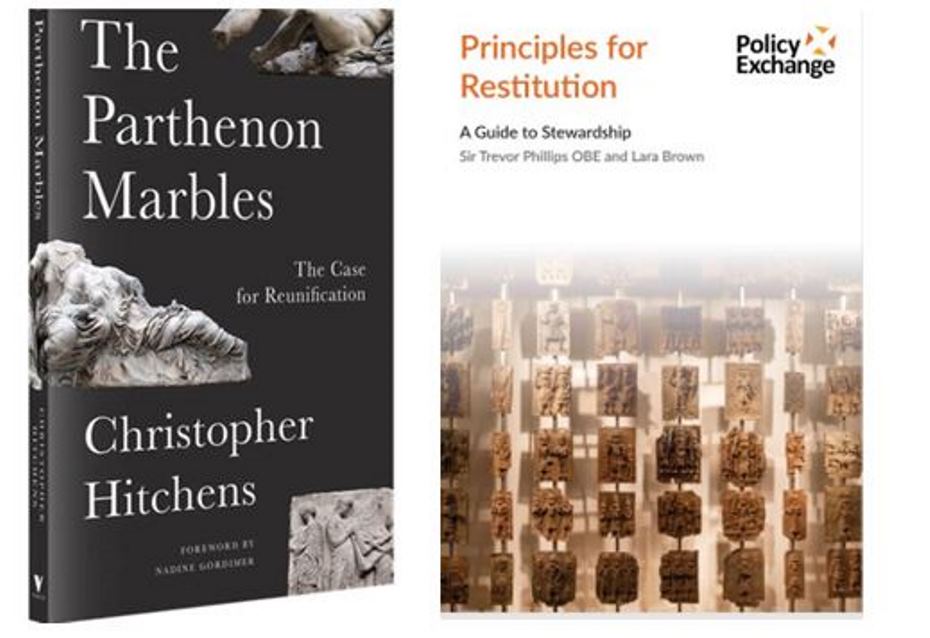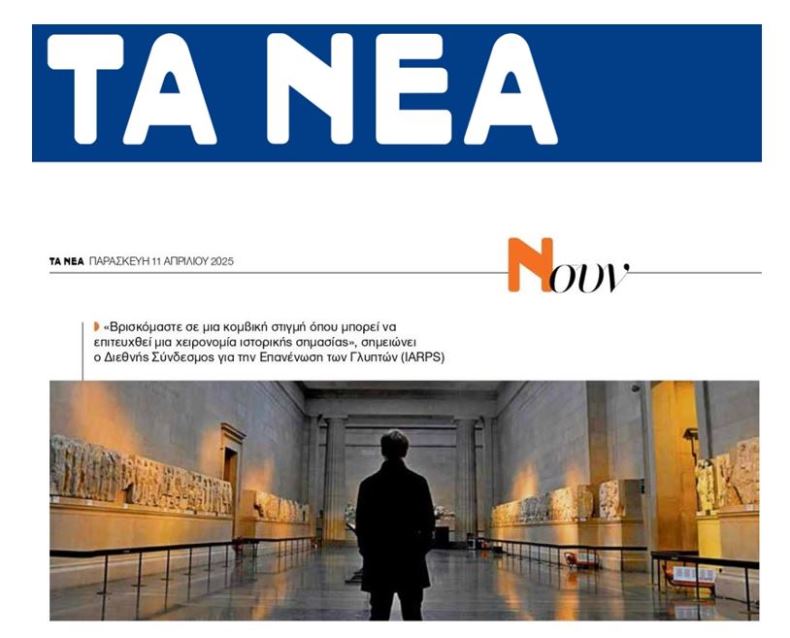Author: XpatAthens
Next time you're in Athens, visit the amazing New Acropolis Museum and take advantage of some of the brief gallery talks hosted by the museum's archaeologists. These brief presentations are held in Greek and English every Friday, Saturday and Sunday. Participation is limited to 20 visitors per session. Coupons are available on a first-in first-served basis Friday, Saturday and Sunday at the Information Desk, Friday (from 3:00 p.m. to 6:00 p.m.), Saturday and Sunday (from 12:30 p.m. to 4:30 p.m.). For further details, please refer to the Information Desk at the Museum entrance. Current Talks in English: Fridays at 5:15 p.m./Horse riders: The aristocrats of Athens. Saturdays at 4:30 p.m./ The sculptor Antenor. Sundays at 4:30 p.m./The Sanctuary of Asclepios: A sacred healing centre.
Meeting Point with participation coupon:
Glass Floor in front of ticket check-in.
Archaeologists-Hosts at the Acropolis Museum:
Archaeologists-Hosts are available to answer your questions about the Museum exhibits every day between 9:30 a.m. and 5:00 p.m. Visitors can find them by looking for staff wearing red and white ‘archaeologist’ badges and circulating in the Museum exhibition areas.
These talks are available during the month of August.
2011 News
28 July 2011
John Melville-Jones writes for neokosmos.com
In recent years the nature of the document that was presented to the British Parliament in 1816, which authorised Lord Elgin to study and copy the ancient Greek sculptures on the Acropolis of Athens, has been investigated.
It is clear that it was not, as has so often been claimed, a 'firman' from the Ottoman sultan, because it lacks some of the formal elements that a true 'firman' would have had. Its exact nature is, however difficult to define. If an official 'firman' was ever issued (and no evidence now exists to prove that this happened), the Italian text that Lord Elgin laid before the parliament with an English translation may have been a précis of this. But it is more probable that it was a more or less accurate translation of an ad hoc document created by an Ottoman official in Athens. For this reason the translation of the document into English that was made by Lord Elgin's chaplain the Reverend Philip Hunt should have been faultless. But it contains a small but significant mistake.
The authorization to remove material from the Acropolis was repeated in the document, essentially in the same words (Hunt's translations follow): e quando volessero portar via qualche pezzi di pietra con vechie inscrizioni, e figure, non sia fatta lor' oposizione …'and should they wish to take away any pieces of stone with old inscriptions, and figures, that no opposition be made …' and: non si faccia opposizione al portar via qualche pezzi di pietra con inscrizioni, e figure … 'nor hinder them from taking away any pieces of stone with inscriptions, and figures …' Two other translations of this document have been made (as noted in the article by Williams cited above).
They all translate the Italian phrase 'qualche pezzi di pietra' in the same way, as 'any pieces of stone'. But this is wrong. Anyone who looks up qualche in an Italian-English dictionary will find that 'any' is one of its meanings. But dictionaries often lead the unwary astray, and 'any' is only a permissible translation in some circumstances. For example, hai qualche libro che posso leggere? might be translated as 'Do you have any book(s) that I can read?' But the proper translation of qualche pezzi di pietra is not 'any pieces of stone' but 'a few pieces of stone' (the Italian of the document is not the best in this case - it is normal to use the singular form of a noun with qualche, so we would expect to read qualche pezzo, but this is not important).
The only time, to my knowledge, that this phrase has been translated correctly into English was in a speech made by Melina Mercouri (the Greek Minister for Culture) to the Oxford Union in 1986.
This does not seem to have attracted any general attention. How many 'pieces of stone' would be implied by qualche pezzi? It is possible to suspect that the language is deliberately vague, but if you ask an Italian what number the phrase might imply, he will smile happily and make supportive gestures if you suggest three or five or seven, but when you reach ten or a larger number he will begin to look doubtful.
So if the conditions of the alleged 'firman' had been strictly observed, Lord Elgin would not have been allowed to take away as many pieces of stone from the Parthenon and other buildings as he did. And if the British Parliamentary Select Committee had had a more exact translation before it in 1816 when it was formed to discuss the possible acquisition of the Elgin Marbles, this might have led to some modification of their decision.
There is no record of any objection from the Ottoman authorities to Lord Elgin's removal of the large number of 'pieces of stone' that he did in fact take, so the mistranslation of this phrase in the 'firman' now has little force in the current argument concerning the repatriation of the Parthenon sculptures. But it is desirable to put the correct translation of the Italian text on the record.
John Melville-Jones is an associate Professor in Classics and Ancient History at University of Western Australia. This note has been prepared on behalf of the Australian Macedonian Advisory Council.
Author: Andrew George, MP
http://www.politics.co.uk
We might not want to be involved in the bail out, but returning the Elgin Marbles would show we are Greece’s friend.
By Andrew George MP
Whilst the current financial crisis dominates all current press coverage relating to Greece, there is no reason why we should use this as an excuse to ignore other key Anglo-Hellenic issues.
At present, news coming from Greece is predominantly negative – returning the Parthenon Sculptures (popularly known as the Elgin Marbles) would give people there something positive – a reason to celebrate and something that would increase the tourist draw to the country, helping to revive their economy.
Co-incidentally, June 20th 2011 marked the second anniversary of the opening of the new Acropolis Museum in Athens – an event that raised the issue of the return of the Parthenon Marbles to a level of global interest. Britain however continues to act as though nothing has changed.
Although the Parthenon Sculptures existed in Greece for over 2000 years, the British Museum has had them for less than 200 years, yet seems to feel that they are now as much a part of the museum as they are a part of Greece's history.
Whenever the issue of the return of these sculptures is raised, the same tired platitudes are heard – references to losing their marbles are made as though it is the first time anyone has tried this joke. At the same time though, this is often used as a way of sidestepping the real issue – a quick joke distracts from the fact that the arguments for the retention of the sculptures are all relatively weak.
For many years, one of the stock arguments used for retention of the Parthenon Sculptures was that Greece had nowhere to put them if they were returned. The New Acropolis Museum has now refuted this reasoning once and for all – few who have visited it would disagree that it creates a far better setting for the sculptures, allowing them to be seen in the context of the Parthenon upon which they were originally designed to be viewed. The sculptures were never loose pieces of artwork that could be located anywhere, but instead formed an integral part of the Parthenon – for this reason, if no other, it can never be claimed with any degree of honesty that they belong in any other part of the world. They were carved from local stone, designed to be seen under the brilliantly sharp Attic light – not to be displayed in a gloomy gallery in London.
As the 2012 Olympics draw closer, perhaps it is time for Britain to reconsider its relationship with Greece – and to think of the many things that it has given the world. As Greece hands over the flame to England, to start the countdown to the Olympics, perhaps it is the ideal time for Britain to consider giving something back in return.
Greece has in the past made generous offers to Britain – that other artefacts (some un-exhibited anywhere previously) would be available as a series of rotating loans if the Parthenon Sculptures were to be returned. The temporary exhibitions are one of the biggest draws to attract repeat visitors to the British Museum – the value of an offer such as this in boosting the museum's popularity should not be underestimated. Whilst countries such as Iran and Egypt have used threats of withdrawal of co-operation with archaeologists and museums to force the return of artefacts help by foreign institutions, Greece has always supported the work of British archaeologists within their country, as well as regularly taking part in inter-museum loans. There is no evidence that it is a country that could not be trusted with the return of the sculptures.
Marbles Reunited (of which I am the chair) campaigns actively for the return of the Parthenon Sculptures to Athens. We have found that despite the popular perception that it is a Greek issue, there are large numbers of English supporters – who understand the reasons for reunifying all the surviving sculptures in a single place, yet do not find this aim to be in any sort of conflict with being British or even supporting institutions such as the British Museum. In many cases they see it as a possibility of righting one of history's wrongs. It is rare that the opportunity is present to take an action such as this – surely Britain should be using the opportunity to define a new era in cultural diplomacy, rather than hiding away from any form of serious discussions.
In many countries, particularly the USA, restitution of disputed artefacts is being tackled by many museums. Despite initial reluctance, many are finding that reciprocal deals can lead to solutions that are acceptable to both of the parties involved in the dispute. Even in cases where the law has specifically mandated resolution of cases, such as those of Native American artefacts, no museums have found that this leads to any sort of emptying of their collections, yet this scare story (that the return of the Parthenon Sculptures would set a dangerous precedent) is regularly put about by members of the British press.
Perhaps Britain should stop seeing the idea of returning the Parthenon Sculptures as losing something that is rightfully theirs. At the time the sculptures were acquired from Lord Elgin, Greece was a territory occupied by the Ottomans and Elgin led many to believe that removal of the sculptures was necessary if they were to be preserved. Even in 1816 when parliament purchased the sculptures from Lord Elgin, it was suggested in the debates that they should only be kept only until such time as an independent Greek state was able to look after them. Once again in 1941, Miss Thelma Cazalet, a National Conservative MP asked the Prime Minister "whether he will introduce legislation to enable the Elgin Marbles to be restored to Greece at the end of hostilities as some recognition of the Greeks magnificent stand for civilisation". At that time, the response was that "inopportune for a final decision" but added that Her Majesty’s government will not fail to give the matter their careful and sympathetic consideration".
Many years have passed since the dark days of the second world war, but that careful and sympathetic consideration by the government has yet to occur. Surely now, it is time to re-evaluate the issue in a fair and unbiased way and see what Britain might contribute to the Greek people in return for all that their country has given us.
Andrew George has been Liberal Democrat MP for St Ives in Cornwall since 1997.
Not surprising that David Cameron has rejected a call for Britain to "put right a wrong" that dates back just short of two centuries by returning the Parthenon marbles to Greece.
The British Committee for the Reunification of the Parthenon Marbles has been campaigning for the reunification of this peerless work of art since 1983. Requests for the return of the Parthenon Marbles began as early as 1835, after Greece gained independence. Other requests followed not just by Greece but by the English that could see the need to 'put right a wrong'. This included Harold Nicholson working at the Near Eastern Department of the Foreign Office when he wrote to Ramsey MacDonald in 1924 to suggest putting 'right an ancient wrong'. Many remember Melina Mercouri's passionate pleas in the early 80's when she was Minister of Culture for Greece. In 2000, Evanghelos Venizelos, pledged that when the Parthenon sculptures are returned the Greek Government will make sure that the Duveen Galleries would always host Greek antiquities on loan for exhibitions. Greece would be willing to send rare and even newly discovered antiquities, which have never been seen outside Greece.
Last but by no mean least was the request by Antonios Samaras when the new Acropolis Museum was opened two years ago in June 2009.
Eddie O'Hara, Chairman for the BCRPM and President of Marbles Reunited commented " the British Committee for the Reunification of the Parthenon Marbles wishes to stress the uniqueness of these marbles as integral structural and artistic components of a Unesco World Heritage Monument, a symbol used by Unesco itself and an iconic symbol of Greek national and ethnic identity, which have been hacked off for display in another country. There can be few if any comparable examples. Given this unique status, it is difficult to sustain the argument that the return and reunification of the Parthenon Marbles in the new Acropolis Museum, would 'open the floodgates' of demands for further restitutions. "
Eddie O'Hara, believes the British Museum has few arguments left to defend its retention of the Marbles.
"The BM Trustees shelter behind the argument that it is the law - that they are entrusted with these artefacts and cannot divest themselves of them," he says. "But the government simply needs to legislate to say 'yes, this is possible'."
David Cameron rejects call to return Parthenon marbles to Greece
PM dismisses suggestion by Liberal Democrat that collection of classical Greek marble sculptures should be returned to Athens
http://www.guardian.co.uk
Hélène Mulholland, political reporter
Andrew George, the Liberal Democrat MP for St Ives, reopened the issue of the marble sculptures, currently in the British Museum, when he incorporated the Greek financial crisis in a Commons question.
George told Cameron at prime minister's questions that Britain could do its bit to help Greece by returning the sculptures to Athens.
He made the suggestion after the prime minister reiterated his belief that the European financial mechanism should be used to bail Greece out of its financial problems.
George told Cameron: "Whilst of course we should not be making a unilateral contribution to the Greek bailout, does the prime minister not agree that we have something which would help regenerate the Greek economy and put right a 200-year wrong – and that is to give the marbles back".
Cameron said he had no intention of allowing Britain to "lose its marbles". He told MPs: "I'm afraid I don't agree ... the short answer is that we're not going to lose them."
http://www.britishmuseum.org/
ANDREW GEORGE MP
HOUSE OF COMMONS
LONDON SW1A 0AA
PRESS RELEASE
Wednesday 22nd June 2011
Losing our marbles?
The MP who leads the British campaign for the restitution of the Parthenon Marbles called upon the Prime Minister not to provide a unilateral contribution to the Greek bail out but to give the Marbles back.
In his question to the PM he said that the return of the ‘Elgin’ Marbles would help to regenerate the flagging Greek economy and put right a wrong committed over 200 years ago.
The Prime Minister refused to consider such a proposal but Mr George argues that public opinion is on his side and that following the recent creation of the new Acropolis Museum Athens would be a far better place for the Marbles, whilst the casts which the British Museum sent to Athens to replace them could be returned for display in London.
ENDS
Author: ANA-MPA
(Photo ANA-MPA)
The New Acropolis Museum celebrates its second anniversary on Monday, 20 June 2011.
The 25,000 square-meter Museum will be open to the public on Monday from 8:00 in the morning until midnight, to celebrate the event.
The Museum includes more than 4,000 exhibits spread over 14,000 square meters of exhibition space.
To mark the event, the City of Athens Symphony Orchestra will stage a free concert at 9:00 p.m., performing works by Strauss, Vivaldi, Tchaikovsky and Piazzola.
Eleni Cubitt pays tribute to Sir Patrick Leigh Fermor.
"It was good to have met him and to have spoken with him about many things, including my interest in World War II. He was a gentleman and his love of Greece and understanding of our campaign, makes him very special. Am sure he will be missed by many and remembered by many more."
- http://patrickleighfermor.wordpress.com
- http://www.bbc.co.uk
- http://www.guardian.co.uk
- http://www.telegraph.co.uk
Page 2 of 4




